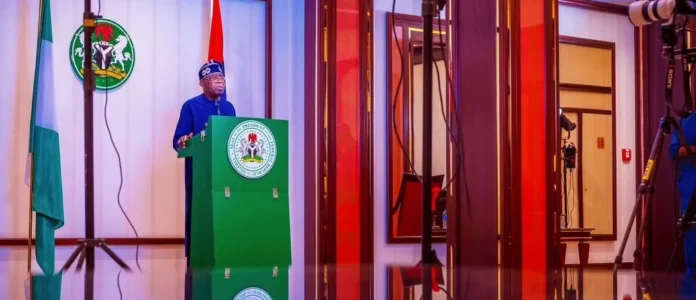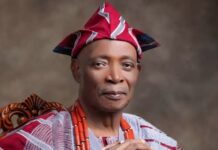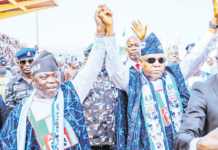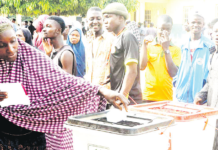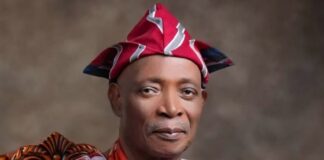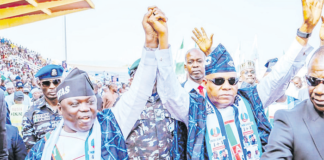Nationwide Protest: Tinubu highlights policies to address cost of living crisis
“The Federal Government will provide all necessary incentives for this initiative, whilst the states provide the land, putting millions of our people to work and further increasing food production.”

On Sunday, President Bola Tinubu listed some of the policies and programmes his government has embarked on to alleviate Nigerians’ suffering.
In his broadcast to address Nigerians who have been protesting for three days in a row over the high cost of living and who are calling for an end to ‘bad governance’, President Tinubu also listed the achievements of his government in the last year.
He urged protesters to suspend the protests and embrace dialogue. However, he ruled out the possibility of returning the petrol subsidy, a major policy that increased the cost of living in the country.
Below are the highlighted policies set to reduce the cost of living
- President Tinubu said the government is set to distribute one million conversion kits of vehicles from petrol or diesel to compressed natural gas (CNG) at extremely low or no cost to commercial vehicles that transport people and goods. He said such vehicles currently consume about 80 per cent of the imported PMS and AGO. He said the government will set up conversion centres across the country in conjunction with the private sector.
“We believe that this CNG initiative will reduce transportation costs by approximately 60 per cent and help to curb inflation,” he said.
2. He said more than N570 billion has been released to the 36 states to expand livelihood support to their citizens, while 600,000 nano-businesses have benefitted from nano-grants.
3. He said an additional 400,000 nano-businesses are expected to benefit from the programme.
4. He said 75,000 beneficiaries have been processed to receive our N1 million Micro and Small Business single-digit interest loans, starting August.
5. The president stated further that the government has also built 10 Micro, Small, and Medium Enterprises (MSME) hubs within the past year, creating 240,000 jobs through them. Five more hubs are in progress and will be ready by October this year.
6. Payments of N1 billion each are also being made to large manufacturers under our single-digit loans to boost manufacturing output and stimulate growth.
7. He said the government is providing incentives to farmers to increase food production at affordable prices. Consequently, tariffs and other import duties have been removed on rice, wheat, maize, sorghum, drugs, and other pharmaceutical and medical supplies for the next six months, in the first instance, to help drive down the prices.
8. He said N45.6 billion has been processed for payment under the student loan scheme for students of tertiary institutions.
9. He said the government has also established the Consumer Credit Corporation with over N200 billion to help Nigerians acquire essential products without the need for immediate cash payments, making life easier for millions of households.
10. The president said he had also ordered the release of an additional N50 billion each for the Students Loan Fund and Credit Corporation from the proceeds of crime recovered by the EFCC.
11. He said the government secured $620million under the Digital and Creative Enterprises (IDiCE) – a programme to empower our young people, creating millions of IT and technical jobs that will make them globally competitive.
12. President Tinubu said the government has also introduced the Skill-Up Artisans Programme (SUPA), the Nigerian Youth Academy (NIYA), and the National Youth Talent Export Programme (NATEP).
13. The president also said he signed the National Minimum Wage into law so the lowest-earning workers will now earn at least N70,000 a month.
14. He said the first phase of the government’s 3,212 housing units at the Renewed Hope City and Estate in Abuja was ongoing. He added that the project is the first of six planned across the nation’s geopolitical zones where a minimum of 1,000 housing units will be delivered.
15. He said the government is also launching the Renewed Hope Estates in every state, each comprising 500 housing units. The goal is to complete a total of 100,000 housing units over the next three years.
“I have been meeting with our Governors and key Ministers to accelerate food production. We have distributed fertilisers. Our target is to cultivate more than 10 million hectares of land to grow what we eat.
“The Federal Government will provide all necessary incentives for this initiative, whilst the states provide the land, putting millions of our people to work and further increasing food production.
“In the past few months, we have also ordered mechanised farming equipment such as tractors and planters, worth billions of Naira from the United States, Belarus, and Brazil. I can confirm to you that the equipment is on the way,” President Tinubu said.
Reeling out the scorecard of his administration just about one year in office, President Tinubu said his government has successfully reduced the revenue-to-debt servicing ratio from 96 per cent to 68 per cent.
He pointed out that his administration has increased government revenue by more than 100 per cent. According to him, the revenue has crossed N9.1 trillion in the first half of 2024 compared to the first half of 2023.
The president said this is due to “efforts at blocking leakages, introducing automation, and mobilising funding creatively without additional burden on the people.”
He added that productivity in the non-oil sector is gradually increasing, reaching new levels and taking advantage of the opportunities in the current economic ambience.
He said the government had also cleared legitimate outstanding foreign exchange obligations of about $5 billion.
He said his government is working to complete inherited projects including roads, bridges, railways, power, and oil and gas developments.
He said the construction of the Lagos-Calabar Coastal Highway and Sokoto-Badagry Highway by his government will open up 16 connecting states, creating thousands of jobs and boosting economic output through trade, tourism and cultural integration
Our once-declining oil and gas industry is experiencing a resurgence on the back of the reforms I announced in May 2024 to address the gaps in the Petroleum Industry Act, he said.
He said Nigeria increased its oil production capacity to 1.61 million barrels per day.
He added that the country’s gas assets are receiving the attention they deserve.
He said the country has seen two Foreign Direct Investments signed of over half a billion dollars.
“This has given us more financial freedom and the room to spend more money on you, our citizens, to fund essential social services like education and healthcare. It has also led to our State, and Local Governments receiving the highest allocations ever in our country’s history from the Federation Account,” he said.

